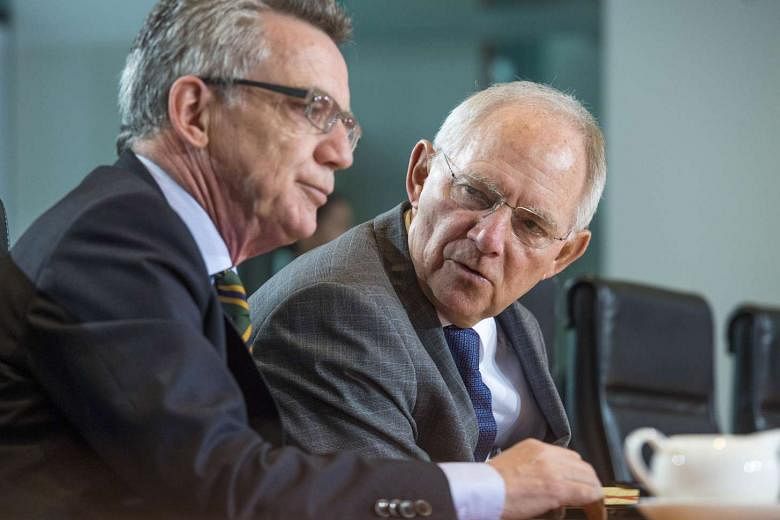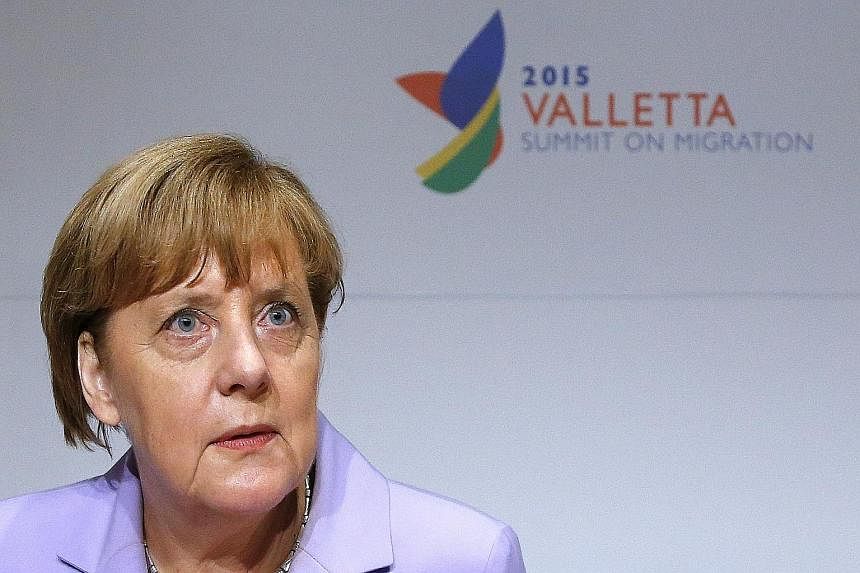Chancellor Angela Merkel is being forced to backpedal on her open- door policy towards asylum-seekers and her authority is being called into question as rebellion within her own party grows over the seemingly endless flood of migrants entering Germany.
This week, she warned that refugees getting asylum in her country will face "long delays" before they can bring over other members of their family. "Family reunion as it has been understood until now cannot currently take place," the German government's official spokesman said on Tuesday.
As the reality of settling a million migrants from trouble spots in the Middle East and Afghanistan sinks in, politicians from Dr Merkel's own Christian Democratic Union (CDU) are clamouring that Germany shut its doors.
In recent days, that clamour has led to dissonance at the top.
Last Friday, when Interior Minister Thomas de Maiziere said Syrians granted refugee status could not bring their relatives into Germany, Dr Merkel's chief of staff Peter Altmaier and government spokesman Steffen Seiber quickly contradicted him.
But shortly after, Finance Minister Wolfgang Schaeuble, a CDU heavy-hitter, and other leading party members came out to back Mr de Maiziere publicly. Dr Merkel's office was conspicuously silent in its response.
On Monday, after a party meeting, CDU general secretary Peter Tauber announced that it was agreed that there should be a review of the Syrian refugees' right to family reunification.
Now Mr de Maiziere is pushing to keep migrants even farther from Germany's border, insisting that they apply for entry first at their point of arrival in Europe.
The growing clout of those seeking to roll back Dr Merkel's migrant policy has alarmed her left-leaning Social Democratic Party (SPD) coalition allies, while the opposition Green party branded their pushback as an attempted putsch.
Dr Merkel's initial decision, taken back in September, to suspend existing immigration procedures and admit all asylum-seekers who manage to get to Germany made her hugely popular with NGOs but stunned Germany's parliamentarians and leaders of the country's 16 federal states, who were not consulted yet are expected to pay for settling all incoming refugees.
The administrative burden is huge, and the results often messy. Asylum-seekers are shunted from one federal state to another.
Welfare offices are overwhelmed, as are schools obliged to teach children of migrants, most of whom cannot speak German.
And, with around 10,000 new arrivals each day, some German federal states are resorting to accommodating them in tents, just as temperatures plummet at the onset of winter.
German voters, unaccustomed to such mayhem in a country which prides itself on good governance, are blaming their Chancellor for this predicament.
Latest opinion polls indicate that her personal popularity ratings have fallen from around two-thirds in August to just 50 percent today.
Although general elections are still two years away, the immigration crisis is spooking government MPs, who are beginning to feel the electoral squeeze in their constituencies from the growth of anti-immigrant populist parties.
The German political system makes it very difficult to topple a sitting government. And, given the current distribution of parliamentary seats, no viable alternative coalition to that currently led by Dr Merkel is feasible.
Still, rumours are rife in Berlin that if the Chancellor does not come up with a convincing plan to control immigration numbers within the next few weeks or by the beginning of next year at the latest, she may be toppled by a rebellion of MPs in her own party.
The most likely person to replace her as chancellor is Mr Schaeuble. Confined to a wheelchair after surviving an assassination attempt and now periodically ill, the 73 year-old politician may not have the stamina to lead the party into the next elections, which must be held by October 2017.
But he has both the capabilities and the personal gravitas to be a transitional chancellor until then, a period during which leaders such as Mrs Ursula van der Leyden, the 57-year-old current Defence Minister, may be ready to take on the baton.
Either way, for the first time in more than a decade, Germany's political class is seriously beginning to contemplate life after Angela Merkel.


